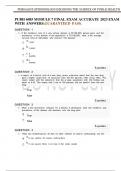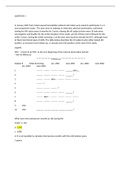Pubh 6035 module - Study guides, Class notes & Summaries
Looking for the best study guides, study notes and summaries about Pubh 6035 module? On this page you'll find 49 study documents about Pubh 6035 module.
Page 2 out of 49 results
Sort by
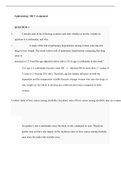
-
PUBH 6035 Module 5 Assignment; Problem Set - Confounding and Effect Modification
- Other • 5 pages • 2022
- Available in package deal
-
- $17.49
- + learn more
A cohort study of liver cancer among alcoholics. Incidence rates of liver canceramong alcoholic men are compared to a group of non-alcoholic men. Is gender a confounder inthisstudy? • Acase-control study of theriskofbeerconsumptionandoralcanceramongmen.Inthis study,cigarettesmokingisassociatedwithbeerconsumptionandisariskfactorfororal cancer among Both beer drinkers and nondrinkers.Iscigarettesmokinga confounderin this study?
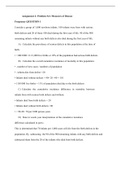
-
PUBH 6035 Module 2 Assignment 2; Problem Set - Measures of Disease Frequency
- Other • 4 pages • 2022
- Available in package deal
-
- $17.49
- + learn more
Assignment2:ProblemSet:MeasuresofDiseaseFrequencyQUESTION1 Consider a group of 1,000 newborn infants. 100 infants were born with seriousbirth defects and 20 of these 100 died during the first year of life. 90 of the 900remaininginfantswithoutanybirthdefectsalsodied duringthefirst yearoflife. A) Calculate the prevalence of serious defects in this population at the time ofbirth. •=100/1000=0.1/1,000livebirthsor10%ofthepopulationhad seriousbirthdefects B) Calculatetheoverallcumulativeincide...
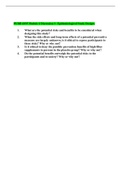
-
PUBH 6035 Module 4 Discussion 1; Epidemiological Study Designs
- Other • 3 pages • 2022
- Available in package deal
-
- $12.49
- + learn more
1. What are the potential risks and benefits to be considered when designing this study? 2. When the side effects and long-term effects of a potential preventive measure are largely unknown, is it ethical to expose participants to these risks? Why or why not? 3. Is it ethical to deny the possible prevention benefits of high-fiber supplements to persons in the placebo group? Why or why not? 4. Do the potential benefits outweigh the potential risks to the participants and to society? Why or why...
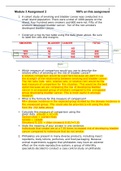
-
PUBH 6035 Module 3 Assignment 2; Problem Set Measures of Association and Impact
- Other • 4 pages • 2022
- Available in package deal
-
- $17.49
- + learn more
1. A cohort study of smoking and bladder cancer was conducted in a small islandpopulation. There were a total of 1000 people on the island. Four hundred weresmokersand600werenot.Fiftyofthesmokersdevelopedbladdercancer.Tenofthenon-smokersdevelopedbladdercancer. • Constructatwobytwotableusingthedatagivenabove.Besuretolabelthecells andmargins. • Whichmeasureofcomparisonwouldyouusetodescribetherelativeeffectofsmoking ontheriskofbladder cancer?. • Whatistheformulaforthismeasureofcomparis...
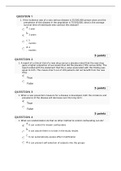
-
PUBH 6035 Module 7 Final Exam.docx
- Exam (elaborations) • 10 pages • 2022
-
- $25.49
- + learn more
1. Question: If the incidence rate of a very serious disease is 25/100,000 person-years and the prevalence of this disease in the population is 75/100,000, what is the average survival time of individuals who contract this disease? 2. Question: A report of a clinical trial of a new drug versus a placebo noted that the new drug gave a higher proportion of successes than did the placebo (70% versus 40%). The report ended with the statement that the p value associated with this finding was equal t...
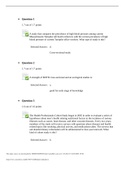
-
HLTH-8035E-1/PUBH-8035H-1/PUBH-8035-1/PUBH-8035D Module 4 Quiz
- Exam (elaborations) • 6 pages • 2022
-
- $8.99
- + learn more
1. A study that compares the prevalence of high blood pressure among current Massachusetts Turnpike toll booth collectors with the current prevalence of high blood pressure of current Turnpike office workers. What type of study is this? 2. A strength of BOTH cross-sectional and an ecological studies is: 3. The Health Professionals Cohort Study began in 2005 in order to evaluate a series of hypotheses about men’s health relating nutritional factors to the incidence of serious illnesses su...
PUBH 6085 MODULE 7 FINAL EXAM ACCURATE 2023 EXAM WITH ANSWERS.GUARANTEED PASS.
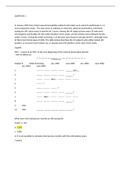
-
PUBH 6035 Module 7 Final Exam
- Exam (elaborations) • 39 pages • 2022
-
- $40.48
- + learn more
1. Question: What were the total person-months at risk during the study? 2. Question: A cohort study of coffee drinking and anxiety was conducted at a university campus. There were a total of 30,000 freshmen who participated. 10,000 were coffee drinkers and 20,000 were not. Of the coffee drinkers, 500 developed anxiety during the 4-year follow-up period. Of the non-coffee drinkers, 200 developed anxiety during the same time period. Assume that no one in the population died or was lost during th...
PUBH 6035 Module 7 Final Exam
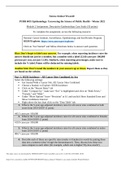
-
PUBH 6035 Module 2 Assignment: Descriptive Epidemiology Case Study (50 points)
- Case • 7 pages • 2023
-
- $13.49
- + learn more
Module 2 Assignment: Descriptive Epidemiology Case Study (50 points)To complete the assignment, access the following resource:National Cancer Institute. Surveillance, Epidemiology and End Results Program.SEER*E:// Answer in complete sentences. (4 points)From 2015 to 2019, there were 445.5 cases per 100,000 for all cancer sites combined in bothsexes: 419.9 cases per 100,000 for women and 484.7 cases per 100,000 for men. Females saw64.8% lower 5-year age-adjusted incidence rates for all cancer sit...

That summary you just bought made someone very happy. Also get paid weekly? Sell your study resources on Stuvia! Discover all about earning on Stuvia



